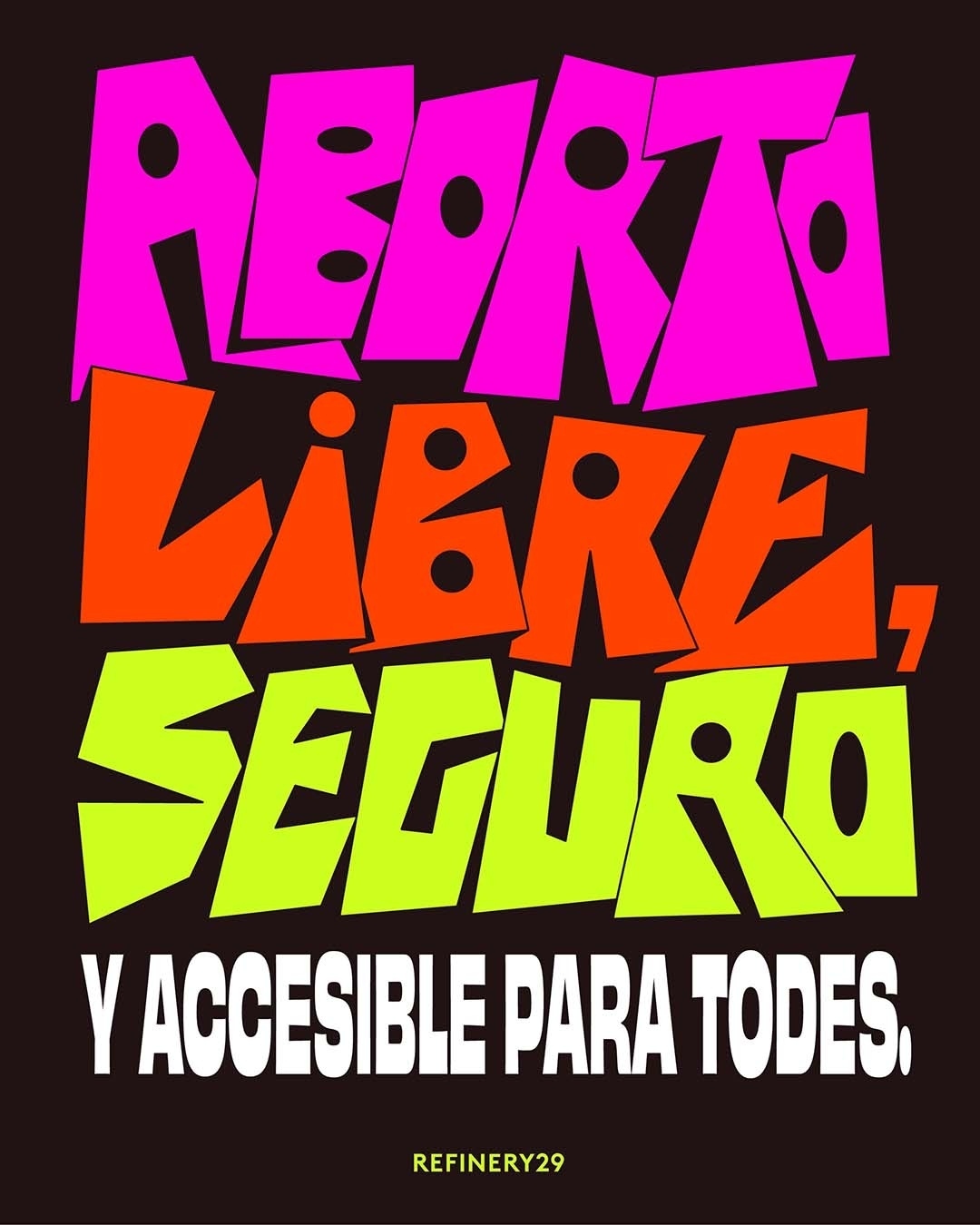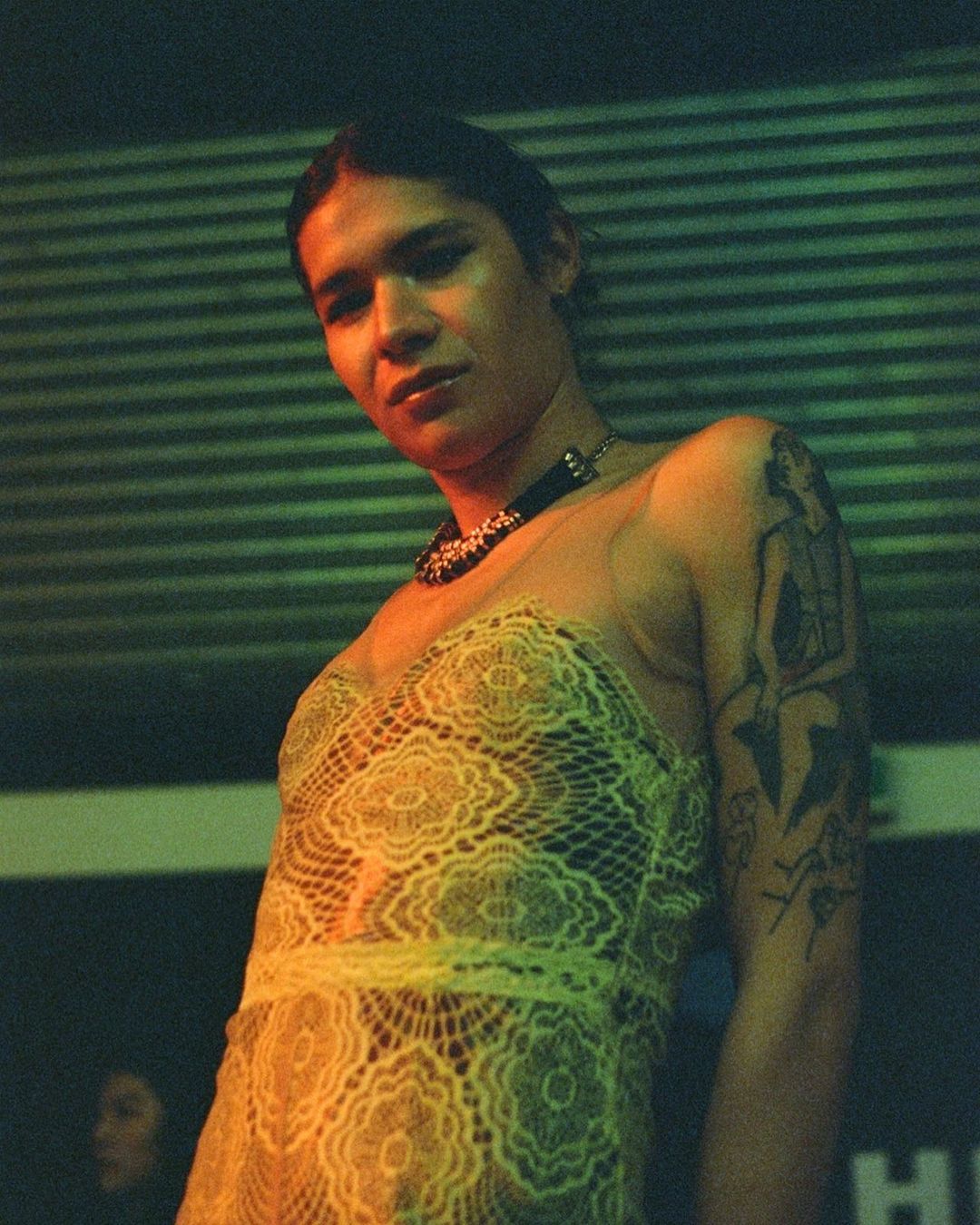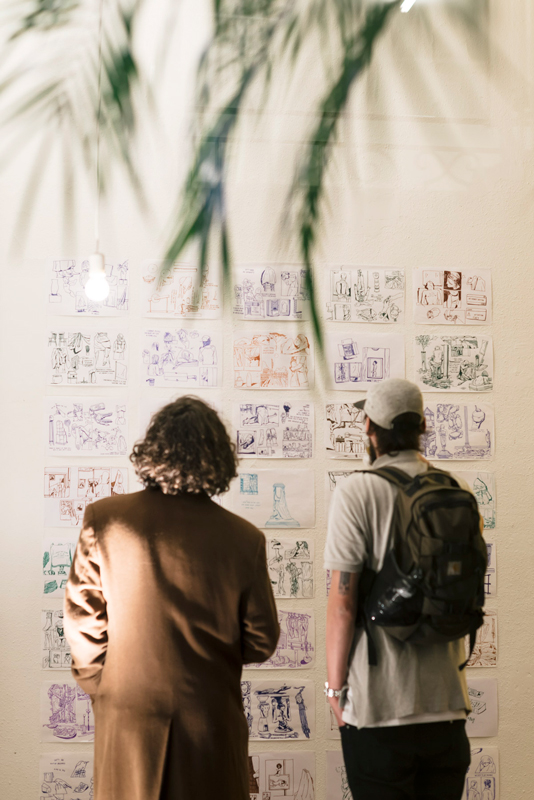Can you talk a little about how the campaign got started? What was the mood like at Refinery 29 When Roe vs. Wade was returned? And why did you think that creating T-shirts specifically would be a good response?
It was Everpress who approached us about creating the T-shirts from posters we had made, I think because you had worked with i-D Magazine before, who are one of our sister brands.
In terms of the very inception of the posters, when we were first working on our coverage of Roe v. Wade, we knew we needed to give it on-site coverage, but we wanted to also create something that felt actionable, because it sort of felt like what was happening was unstoppable. So our design team came together prior to Everpress approaching us, they said, “Let’s make posters for the abortion rights rallies that are happening around the country.” And the team got together and we ended up making nine posters, which the art team helped design with illustrators. So we had made these downloadable, for people to print at home and bring to protests, and I think Everpress saw those and said, “These are super cool, can we work together to put these on a T-shirt?” It just made perfect sense, it just clicked.
We wanted to create something that felt actionable
I think for us, we knew with the leaked draft opinion from the Supreme Court that this was possible. We’d been expecting it because that had been circulating, and we’d been preparing for it, but of course it was still just so gutting to hear. I remember I kept refreshing my Twitter, and when I saw that first tweet to say Roe vs. Wade had been overturned, it was just heartbreaking. Doing these T-shirts felt like a way to do something actionable, in a time when we feel like a lot of power is being taken from us.
Yes because there’s not really anything you can democratically do, is there?
There’s nothing you can democratically do, exactly. What you can do now, in your individual states right now there are certain things you can do. So if there’s abortion on the ballot in your state for places including Kansas, Kentucky, Montana and Vermont, you could put pressure on your district attorney not to criminalise abortion, or vote for pro-choice legislators. But at the Supreme Court level, there is no vote outside, it’s just these people in the room deciding our future.
Abortion access is an intersectional issue, in that it disproportionately affects communities who are already marginalised. Your campaign puts a strong emphasis on this, with slogans like, “Abortion restriction are racist.” Why is it so important to think of abortion access as an issue that intersects with race and class?
I think the history of America is that American institutions don’t protect Black and Latinx people. It’s evident in everything, how people are treated in the workplace even, and what’s really fascinating to me about the US is that we have the highest rate of maternal mortality of any economically strong nation, so women are still dying at high rates. Black women are three times more likely to die giving birth, native women twice as likely, rural women one and a half more times likely to die. We know that abortion bans disproportionately harm Black people and Latinx people, so to ignore that just wouldn’t work, it needed to be front and centre of this campaign.
Abortion bans disproportionately harm Black and Latinx people
It seems like it’s difficult at the minute even to have a firm grasp on how the law has changed, and what it means for individuals in different states.
I think it’s also because laws vary from state to state, and even when Roe v. Wade was overturned, there are still injunctions that have to pass which then make make abortion illegal within a state. And then there’s the question of say, self-managed abortion, or abortion pills, all this different information is circulating in this area where people don’t know what the hell to do – is it legal to do something, is it not? It’s so confusing.
That’s why, for us, a big part of our coverage is just taking all this information that’s out there and trying to distil it into, “Okay, this is actually what this looks like.” And if you are still thinking, “What the hell is happening?” then we have those organisations on the back of the T-shirts. Plan C, for example, they are an organisation that works across the country to show how you can access abortion pills safely in your state without fear of being criminalised for it.
That was a big part of adding the organisation contact details on to the back of the T-shirts, we just want to show people that there are these resources out there to help them safely access healthcare.
It’s also helpful to create a kind of directory of useful organisations, because the problem of the Internet is that while both it and social media can be really useful, they can also be real sources of misinformation. So you can have Google at your fingertips, but it doesn’t necessarily mean you’re going to be able to access the information you need.
Yes completely. At the minute there are these things called Crisis Pregnancy centres, they’’’ come up high in Google search, and you look at the website, and the framing is, “We are here to help you through your pregnancy, all your needs, including abortion.” But when you go to them, they are actually masquerading as abortion provision, but in reality they’re trying to talk you out of having an abortion. People don’t generally know that, and they especially target young people.
Your ‘I had an abortion T-shirt’ aims to help destigmitise abortion. There’s a long history of activists not only working to widen abortion access, but to remove the code of silence around abortion. Why do you think it’s so important to work to not just make abortion legal and widen access, but to also destigmatise it?
I was working with a writer on a piece around this, and I can’t say it better than her. Her name is Stephanie Loraine Piñeiro, from the Florida Access Network, and the way she put it in this piece was, “abortion stigma is one of the biggest barriers outside of access and cost, because it turns an individual health decision into a social and moral one.”
Abortion is literally health care
It’s nobody’s business, but everyone has a perspective on this issue, literally everyone, and you kind of see everyone coming out of the woodwork to talk about it, and people surprising you with their perspective. And other people’s opinions can really, really impact the care that someone chooses to take. So that’s why we made that T-shirt, for people who felt comfortable to kind of put that out there, to help promote the realisation that abortion is literally health care, it is a part of reproductive health care.
All the proceeds from your tees went to the National Network of Abortion Funds. Can you talk a little about their work?
Yes, 100% went to the National Network of Abortion Funds. They work to remove financial and logistical barriers to abortion access through a network of abortion funds across the country, and they have around 80 organisations in the network. So they might work with clinics to help pay for your abortion, they can offer support from everything from transportation, if say you’re living in a rural area, to childcare, translation, doula services, places to stay, or all of the above. They provide all kinds of support and basically work to remove any barriers to accessing abortion.
It’s now sometimes said that we’re ‘going back in time’ to a point before many of the rights we’ve taken for granted for decades were achieved. In the ‘70s especially, media for and by women, like Spare Rib Magazine in the UK, and Ms. Magazine in the US, played a really active role in helping educate and politicise its readers. What do you think the role of outlets like Refinery29 is in our current landscape?
Everyone was writing about Roe vs. Wade, so it’s hard, right? Because everyone’s writing about this, from the New York Times, to small blogs. I think for Refinery29, we do two things really well. One, we centre the personal narrative, the personal stories, so we’re giving a personal point of view of what people might be going through as they are facing these restrictions. That was really key to us. Because we couldn’t report on daily news, we have a tiny team, so we’re not a daily newsroom, so you’re coming to us for the sentiment, the personal narrative, of what it’s like to go through this.
Our goal is to parse through all that information
And we’re also a service media outlet. So our goal, like I said at the start, is to parse through all that information, all that noise out there, and say, “Okay, if you’re experiencing this, or if you’re in this state, here’s what you need to know.” Or like, “This is how you actually can do a self-managed abortion,” or, “This is how this will affect you moving forward,” “This is the future of birth control, are they coming after birth control next?” So we’re just trying to take all that info and condense it down into, not snackable, still well-researched and nuanced points, but to be able to say, if you’re worried about this, this is what you need to know, and here are your resources.
Relatedly, the present can feel very difficult, with basic rights that were secured long ago are now being stripped away. Right now, what gives you hope?
I think our audience and our readers, seeing the people who were out there the day to protest the decision was overturned to protest, with some of the signs we had made. That was really, really powerful. I also feel energised by the people who are running these clinics and networks across the country, sometimes in really dangerous and precarious situations, and they’re not giving up, and they’re still shouting from the rooftops. And our team in general, they work tirelessly. The Life team who did a lot of this coverage, and the larger team too, they just gave everything they could, whether it was stories, talks on Twitter spaces, TikTok lives, attending the protests, they just gave their all, and you could really see that heart. So that’s giving me hope, a little bit. And then just being able to write about it, and being able to cover it, it feels actionable. I don’t know if that makes sense. But as a journalist, like I think as a citizen, you might feel like your hands are tied, but us writing about it and covering it feels like we were doing something, at least.
Read More: Hi-Vis Vests, Slogan T-shirts, and Sunday Best: When Clothing Is Protest






